08/18/2015

In 2010, 2.5 million people in the United States suffered from a traumatic brain injury (TBI), according to the Centers for Disease Control and Prevention. Some of those also ended up developing a post-injury mental health issue, such as depression or anxiety. For years, physicians have attempted to uncover the prevalence and cause of depression following a traumatic brain injury, and now they may have had a breakthrough.
White Matter and TBI
Recently, researchers at the University of Pittsburgh Medical Center published a study about a possible link between the amount of damage seen in axons to the instance of depression and anxiety after traumatic brain injuries. Axons, or white matter, are the parts of brain cells responsible for passing signals from one cell to the next. In the study, researchers used MRI scans using a diffusion-tensor imaging technique to test two groups of people who had suffered a traumatic brain injury. The first group of 45 subjects reported having psychological issues such as depression, irritability and anxiety. The second group of 29 individuals reported no mental issues.
Researchers noticed that certain white matter areas in the group of TBI patients suffering from depression had decreased functionality compared to the control group, particularly in the part of the brain that is strongly associated with the brain’s reward circuit. The doctors noted that this dysfunctional reward circuitry of the brain injured in TBI patients with depression was very similar to those suffering from depression without a traumatic brain injury. This suggests treatment methods for non-trauma depression patients may be applicable to those with TBI.
For those with anxiety, white matter injury pattern was observed in an area of the brain that is believed to be involved in the regulation of response to fear. Since that part of the brain isn’t typically linked to anxiety disorders in people who haven’t suffered from traumatic brain injury, it may suggest a need to treat these cases differently than typical anxiety.
Better Treatment for Better Outcomes
The study offers more detail about the relationship, long observed in traumatic brain injury patients, between the physical damage and the occurrence of psychological disorders. As clinicians understand more about how and where brain damage occurs following a traumatic brain injury, they can better prepare to treat the resulting side effects. For more information on traumatic brain injuries, visit our website and follow us on Twitter, Facebook, and LinkedIn.